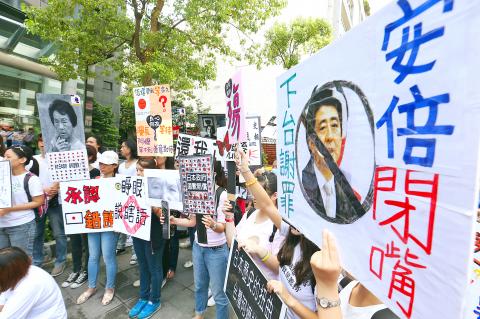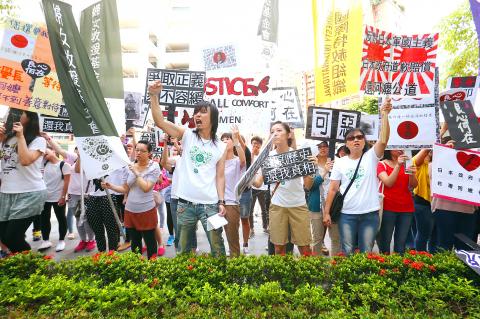On the eve of the 69th anniversary of Japan’s surrender in World War II, dozens of rights advocates yesterday demonstrated outside the Japanese representative office in Taipei, calling on Tokyo to formally apologize for forcing hundreds of thousands of women and girls to serve in military brothels during the war and to compensate them.
“The Japanese military forcibly recruited more than 1,000 Taiwanese women to serve as ‘comfort women’ in military brothels during World War II. Only five are still alive,” Taipei Women’s Rescue Foundation executive director Kang Shu-hua (康淑華) told the crowd outside the Interchange Association, Japan’s Taipei office.
“They are over 90 years old and their physical condition does not allow them to be here. Therefore, it is our obligation and responsibility to continue the struggle to fight for their rights,” Kang said.

Photo: CNA
Taiwan Women’s Link chairwoman Huang Sue-ying (黃淑英) echoed Kang’s appeal.
“The sorrow and the pain in the minds of the former comfort women have become part of our emotions. We will never stop our action to demand justice from Japan,” Huang said.
A Japanese official surnamed Murata took a petition from the demonstrators, promising to forward it to the Japanese government, and provide a response within one month.

Photo: CNA
“Comfort women” refers to women from Taiwan, Korea, China, the Philippines, Indonesia and elsewhere who were forced into military brothels to serve Japanese soldiers. The exact number of comfort women remains unknown, but most researchers agree that there were hundreds of thousands.
The foundation estimates that about 1,200 came from Taiwan.
Japan denies that the government or the Imperial Army forced women to work in brothels — with the latest investigation report, released in June, concluding that “it could not be confirmed that those women were forced into the service.”
However, in 1993, after hearing testimony from 16 South Korean women, Japan offered “sincere apologies and remorse” to the women, and vowed to face the historical facts squarely, in a statement released by then chief Cabinet secretary Yohei Kono.
The following year, Tokyo set up the privately funded Asian Women’s Fund to pay compensation to women in Taiwan, South Korea, the Philippines, Indonesia and the Netherlands, but many surviving comfort women refused to take the money because it did not come directly from the Japanese government.
“The comfort women issue is a global issue Japan should offer national-level apologies and compensations for the dignity of the former comfort women and their families,” Amnesty International Taiwan director Bo Tedards said.
Surviving comfort women and human rights groups in South Korea, the Philippines and several other nations also held rallies outside Japanese diplomatic posts yesterday.
There is an international campaign calling on the UN to make Aug. 14 a day to remember comfort women.

The Ministry of Education (MOE) is to launch a new program to encourage international students to stay in Taiwan and explore job opportunities here after graduation, Deputy Minister of Education Yeh Ping-cheng (葉丙成) said on Friday. The government would provide full scholarships for international students to further their studies for two years in Taiwan, so those who want to pursue a master’s degree can consider applying for the program, he said. The fields included are science, technology, engineering, mathematics, semiconductors and finance, Yeh added. The program, called “Intense 2+2,” would also assist international students who completed the two years of further studies in

Former president Tsai Ing-wen (蔡英文) departed for Europe on Friday night, with planned stops in Lithuania and Denmark. Tsai arrived at Taiwan Taoyuan International Airport on Friday night, but did not speak to reporters before departing. Tsai wrote on social media later that the purpose of the trip was to reaffirm the commitment of Taiwanese to working with democratic allies to promote regional security and stability, upholding freedom and democracy, and defending their homeland. She also expressed hope that through joint efforts, Taiwan and Europe would continue to be partners building up economic resilience on the global stage. The former president was to first

Taiwan will now have four additional national holidays after the Legislative Yuan passed an amendment today, which also made Labor Day a national holiday for all sectors. The Chinese Nationalist Party (KMT) and Taiwan People’s Party (TPP) used their majority in the Legislative Yuan to pass the amendment to the Act on Implementing Memorial Days and State Holidays (紀念日及節日實施辦法), which the parties jointly proposed, in its third and final reading today. The legislature passed the bill to amend the act, which is currently enforced administratively, raising it to the legal level. The new legislation recognizes Confucius’ birthday on Sept. 28, the

MORE NEEDED: Recall drives against legislators in Miaoli’s two districts and Hsinchu’s second district were still a few thousand signatures short of the second-stage threshold Campaigners aiming to recall Chinese Nationalist Party (KMT) legislators yesterday said they expect success in 30 out of 35 districts where drives have passed the second-stage threshold, which would mark a record number of recall votes held at once. Hsinchu County recall campaigners yesterday announced that they reached the second-stage threshold in the recall effort against Legislator Lin Szu-ming (林思銘). A total of 26,414 signatures have been gathered over the past two months, surpassing the 10 percent threshold of 23,287 in Hsinchu County’s second electoral district, chief campaigner Hsieh Ting-ting (謝婷婷) said. “Our target is to gather an additional 1,500 signatures to reach